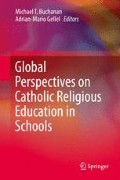Abstract
Over the years, the focus of Catholic Religious Education in Polish schools has shifted from teaching the catechism, doctrines and morals to a multidimensional educational process. Similarly, there has also been a shift from an apologetic system to a more critical approach. However, the key historical, political, cultural and religious issues of the past have strongly impacted upon RE in Polish schools in contemporary times. This chapter presents and evaluates the complex issue of Catholic Religious Education in Polish schools. It explores the social, political and religious context in Poland since 1945 and gives a brief history of religious education in Poland. It then draws attention to the basic assumptions of the aims and content of Catholic Religious Education and provides a critical evaluation of the current challenges facing Catholic Religious Education in Poland. These challenges include such imperatives as an attitude of dialogue, providing learning for life, personal and religious development of pupils, the dignity of the human person, identity formation, teaching critical thinking skills, moral formation, promoting new models of collaboration with the family and developing effective methodologies and communication. The emerging trends impacting on Catholic Religious Education in Poland need to be evaluated in the light of the Gospel while searching for creative responses appropriate to present and future contexts.
Access this chapter
Tax calculation will be finalised at checkout
Purchases are for personal use only
References
Act on the Development of Education and Upbringing. Journal of Laws 1961 no. 32 item 160 (Ustawa z dnia 15 lipca 1961 r. o rozwoju oświaty i wychowania. Dziennik Ustaw).
Davies, N. (2001). Heart of Europe: A short history of Poland. Oxford, UK: University Press.
Doppke, J. (1992). Przemiany katechizacji w szkole. In M. Majewski (Ed.), Katechizacja w szkole (pp. 13–29). Lublin, Poland: ITS.
ISKK, GUS. (2014). Kościół katolicki w Polsce 1991–2011. Rocznik statystyczny, Warszawa, Poland: Instytut Statystyki Kościoła Katolickiego oraz Główny Urząd Statystyczny.
Komisja Wychowania Katolickiego Konferencji Episkopatu Polski. (2001). Program nauczania religii. Kraków, Poland: WAM.
Komisja Wychowania Katolickiego Konferencji Episkopatu Polski. (2010). Program nauczania religii rzymskokatolickiej w przedszkolach i szkołach. Kraków, Poland: WAM.
Konferencja Episkopatu Polski. (2001a). Dyrektorium katechetyczne Kościoła katolickiego w Polsce. Kraków, Poland: WAM.
Konferencja Episkopatu Polski. (2001b). Podstawa programowa katechezy Kościoła katolickiego w Polsce. Kraków, Poland: WAM.
Konferencja Episkopatu Polski. (2010). Podstawa programowa katechezy Kościoła katolickiego w Polsce. Kraków, Poland: WAM.
Majewski, M. (1995). Pedagogiczno-dydaktyczne wartości katechezy integralnej. Kraków, Poland: Poligrafia Salezjańska.
Mąkosa, P. (2011). Współczesne ujęcia nauczania religii w europejskim szkolnictwie publicznym. Roczniki Pastoralno-katechetyczne, 3, 123–136.
Mąkosa, P. (2012). The Catholic identity of polish youth at the beginning of the 21st century. In M. Kalsky & P. Nissen (Eds.), A glance in the mirror. Dutch and polish religious cultures (pp. 79–90). Münster/Berlin/Wien, Germany/London, UK: LIT Verlag.
Misiaszek, K. (2010). Koncepcja nauczania religii katolickiej w publicznej szkole polskiej. Warszawa, Poland: TNFS.
Osewska, E. (2013). Religious Pluralism from the perspective of Central and Eastern Europe. In G. Byrne, & P. Kieran (Eds.), Toward mutual ground: Pluralism, religious education and diversity in Irish Schools (pp. 133–143). Dublin, OH: Columbia Press.
Osewska, E. (2012). The current situation of education and continuing professional development of RE teachers in Poland in the context of the social challenges. The Person and the Challenges, 3(2), 123–131.
Osewska, E., & Stala, J. (2008). Catholic school. Polish perspective, Rivista lasalliana, 2(75), 241–246.
Rada Szkół Katolickich. (2014). Szkoły katolickie. Retrieved from http://www.rsk.edu.pl/
Rossiter, G. M. (2002). Addressing an apparent crisis for Catholic school religious education: The importance of ‘relevance’ and of the theme ‘search for meaning’. Journal of Religious Education, 50(2), 53–61.
Stala, J. (2014). Katechese im Zeitalter der Postmoderne. “Grundsatzprogrammfür die Katechese der Kirche in Polen” aus dem Jahr 2010. Bogoslovni vestnik, 74(nr 1), 107–117.
Stala, J. (2010). Lehrpläne und Schulbücher für den Religionsunterricht an den Staatlichen Grundschülen in Polen. Bogoslovni vestnik, 70(3), 405–414.
Stala, J. (2011). Discovering God with children with the help of R.E. Books in a Polish context. In F. Kraft, H. Roose, & G. Büttner (Eds.), Symmetrical communication? Philosophy and theology in classrooms across Europe (pp. 49–59). Loccum, Germany: RPI.
Tomasik, P. (2003). Regulacje prawne nauczania religii. In J. Stala (Ed.), Wybrane zagadnienia z katechetyki (pp. 73–109). Tarnów, Poland: Biblos.
Zając, M., & Mąkosa, P. (2009). Faithfulness to God and to people. Religious education in Poland. In H. G. Ziebertz & U. Riegel (Eds.), How teachers in Europe teach religion. An international empirical study in 16 countries (pp. 169–180). Berlin, Germany: LIT Verlag.
Ziebertz, H.-G. (2003). Religious education in a Plural Western Society. Münster, Germany: Problems and Challenges.
Author information
Authors and Affiliations
Corresponding author
Editor information
Editors and Affiliations
Rights and permissions
Copyright information
© 2015 Springer International Publishing Switzerland
About this chapter
Cite this chapter
Osewska, E. (2015). Catholic Religious Education in Schools in Poland: Historical Perspectives and Contemporary Challenges. In: Buchanan, M., Gellel, AM. (eds) Global Perspectives on Catholic Religious Education in Schools. Springer, Cham. https://doi.org/10.1007/978-3-319-20925-8_17
Download citation
DOI: https://doi.org/10.1007/978-3-319-20925-8_17
Publisher Name: Springer, Cham
Print ISBN: 978-3-319-20924-1
Online ISBN: 978-3-319-20925-8
eBook Packages: Humanities, Social Sciences and LawEducation (R0)

